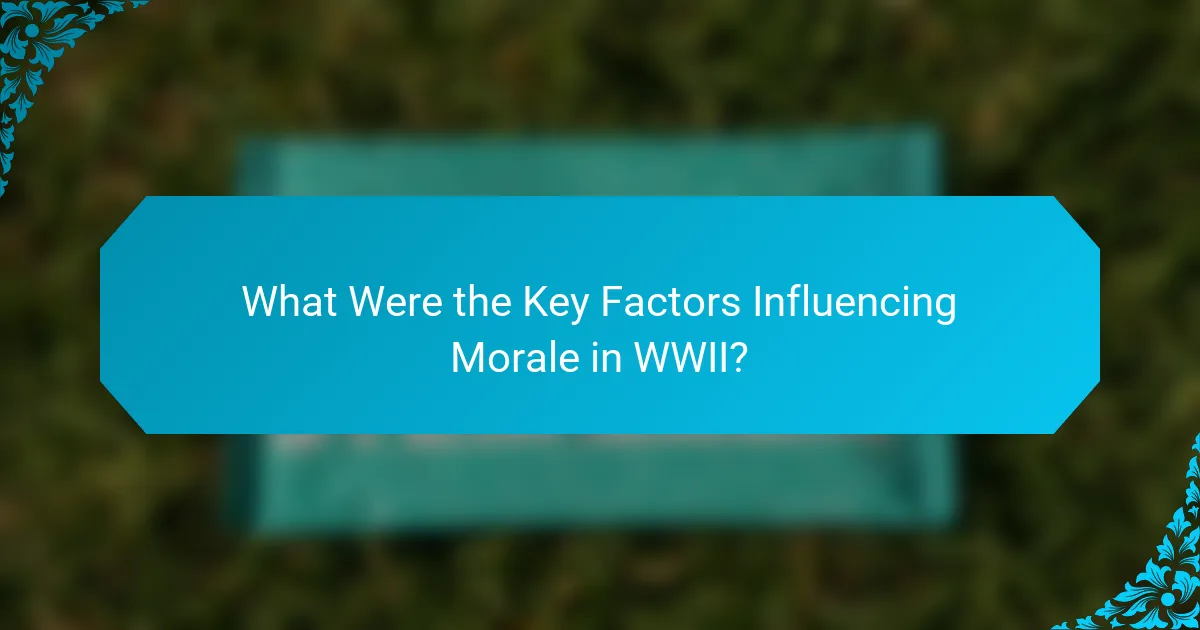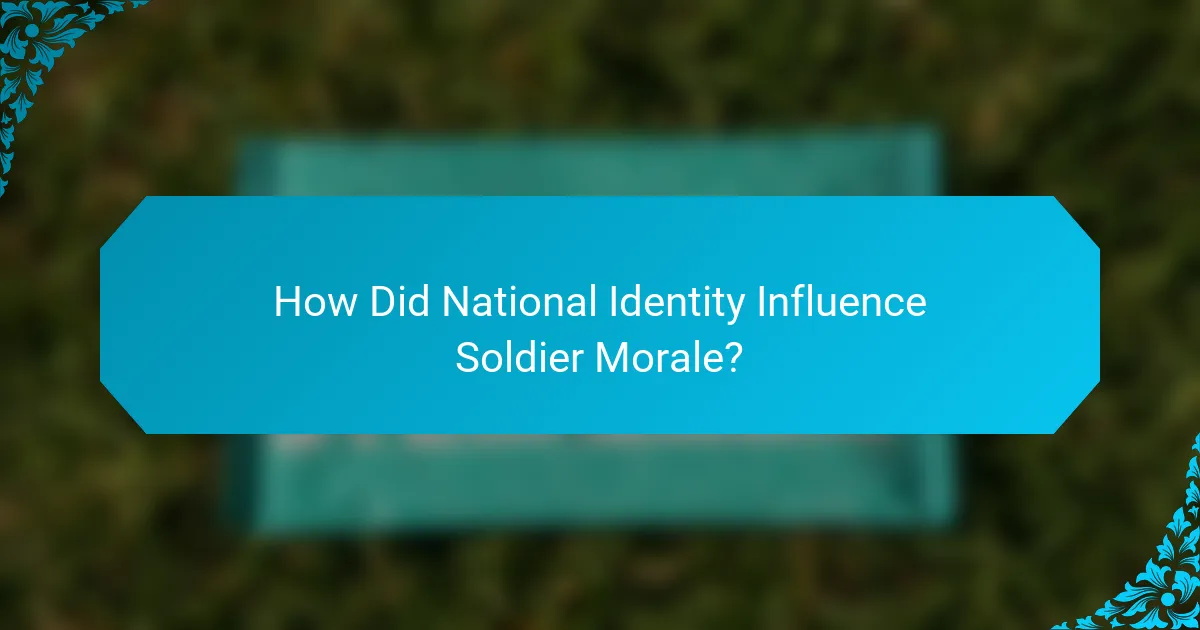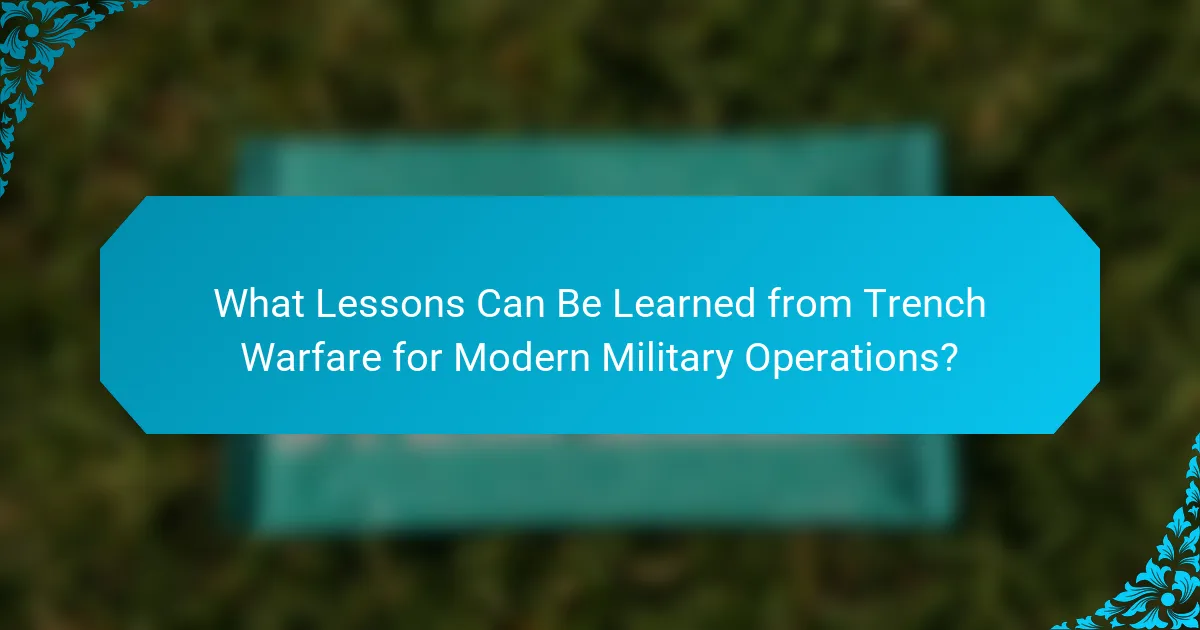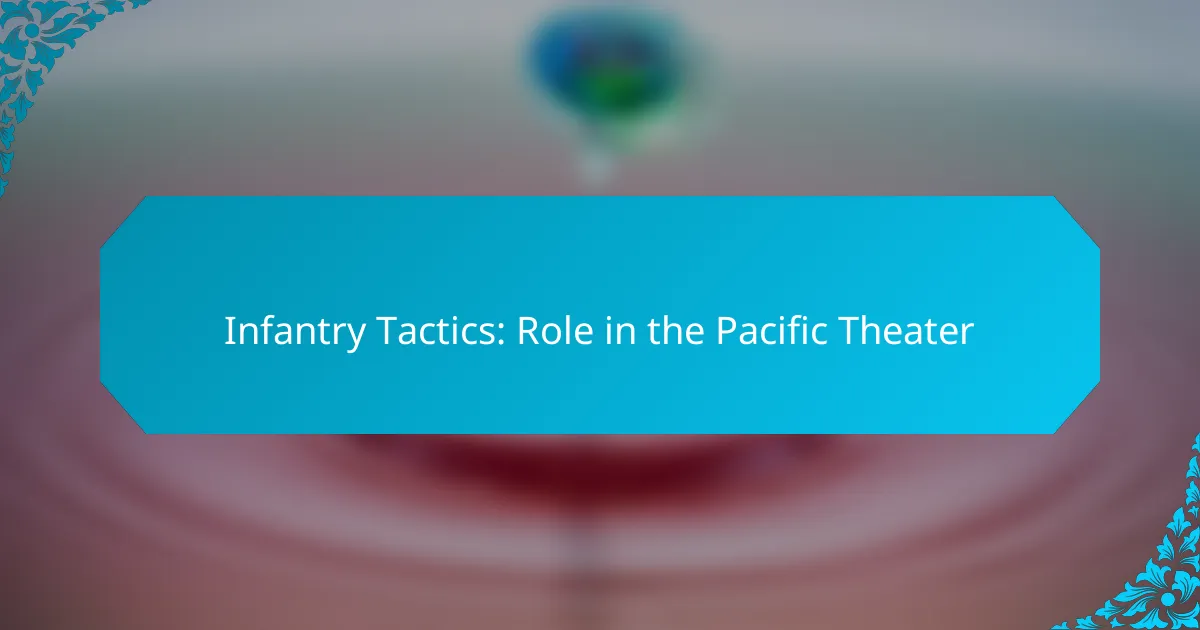Trench warfare profoundly affected soldier morale during both World Wars, subjecting troops to extreme psychological stress and harsh living conditions. In World War I, the constant threat of enemy fire fostered a pervasive sense of fear and hopelessness, while in World War II, factors such as trench conditions, propaganda, and leadership played vital roles in sustaining the fighting spirit of soldiers. To combat the detrimental effects of prolonged combat, military leaders introduced strategies aimed at providing rest, recreation, and psychological support to enhance morale.

How Did Trench Warfare Affect Soldier Morale in WWI?
Trench warfare significantly impacted soldier morale during World War I by creating extreme psychological stress and challenging living conditions. Soldiers faced constant threats from enemy fire, leading to a pervasive sense of fear and hopelessness that eroded their mental well-being.
Psychological stress from prolonged exposure
Prolonged exposure to the horrors of trench warfare resulted in severe psychological stress for many soldiers. The constant threat of death, coupled with the sight of injuries and fatalities, led to conditions such as shell shock, now recognized as PTSD. Soldiers often experienced anxiety, depression, and emotional numbness, which diminished their ability to function effectively.
Many soldiers reported feeling trapped in a cycle of fear and despair, as the trenches became synonymous with suffering and death. The relentless nature of combat and the lack of respite contributed to a decline in morale, making it difficult for troops to maintain a sense of purpose or hope.
Impact of living conditions on mental health
The living conditions in the trenches were dire, which further exacerbated mental health issues among soldiers. Overcrowding, poor sanitation, and exposure to harsh weather created an environment rife with disease and discomfort. Soldiers often dealt with mud, vermin, and a lack of clean water, which led to physical ailments that compounded their psychological distress.
These adverse living conditions fostered a sense of hopelessness and despair. The inability to find relief or comfort in their environment contributed to a pervasive feeling of isolation, making it challenging for soldiers to maintain their morale amidst the chaos of war.
Role of camaraderie in boosting morale
Camaraderie played a crucial role in boosting morale among soldiers in the trenches. The bonds formed between comrades provided emotional support and a sense of belonging, which helped mitigate the effects of stress and hardship. Sharing experiences, fears, and even moments of levity allowed soldiers to cope with the grim realities of trench life.
Unit cohesion often became a lifeline, as soldiers relied on each other for encouragement and motivation. Acts of kindness, shared meals, and collective rituals helped maintain a sense of humanity, fostering resilience in the face of overwhelming adversity.

What Were the Key Factors Influencing Morale in WWII?
In WWII, soldier morale was significantly influenced by factors such as trench conditions, propaganda, and leadership. These elements played crucial roles in maintaining the psychological well-being and fighting spirit of troops in the face of adversity.
Differences in trench conditions compared to WWI
Trench conditions in WWII differed markedly from those in WWI, primarily due to advancements in warfare technology and tactics. While WWI trenches were often muddy, cramped, and unsanitary, WWII saw improved designs and more mobile warfare, reducing the time soldiers spent in static positions.
Additionally, the introduction of mechanized warfare meant that soldiers experienced less prolonged exposure to the horrors of trench life. This shift helped alleviate some of the psychological burdens associated with trench warfare, contributing to higher morale among troops.
Propaganda’s role in maintaining morale
Propaganda played a vital role in sustaining soldier morale during WWII by fostering a sense of purpose and unity. Governments utilized various media, including posters, films, and radio broadcasts, to promote positive narratives about the war effort and the importance of victory.
Effective propaganda not only boosted morale among soldiers but also reinforced their commitment to the cause. By portraying the enemy as a significant threat and emphasizing the righteousness of their mission, propaganda helped maintain a fighting spirit even in challenging circumstances.
Leadership and its effect on soldier confidence
Leadership significantly impacted soldier confidence and morale during WWII. Charismatic and competent leaders inspired troops, instilling a sense of trust and loyalty. When leaders communicated effectively and demonstrated commitment to their men, it fostered a strong bond that enhanced morale.
Conversely, poor leadership could lead to disillusionment and decreased morale. Soldiers were more likely to remain motivated when they felt their leaders were genuinely concerned about their well-being and success on the battlefield.

What Strategies Were Used to Improve Morale During Warfare?
To enhance soldier morale during trench warfare in WWI and WWII, military leaders implemented various strategies focused on rest, recreation, and psychological support. These approaches aimed to alleviate the stress and fatigue associated with prolonged combat conditions.
Implementation of rest periods and rotation
Rest periods and rotation were crucial for maintaining soldier morale. Troops were often rotated between the front lines and quieter areas, allowing them to recuperate physically and mentally. This practice helped reduce fatigue and the psychological toll of constant combat exposure.
Typically, soldiers would spend a few weeks in active duty followed by a similar duration in rest zones. This cycle aimed to ensure that troops remained effective and less prone to combat stress disorders.
Use of recreational activities and entertainment
Recreational activities and entertainment played a significant role in boosting morale. Military units organized games, sports, and movie screenings to provide soldiers with a much-needed distraction from the harsh realities of war. These activities fostered camaraderie and offered a sense of normalcy amidst chaos.
For example, some units set up makeshift theaters or sports fields, allowing soldiers to engage in friendly competitions or enjoy films. Such initiatives were vital in maintaining a positive outlook and reducing feelings of isolation.
Psychological support and counseling services
Psychological support and counseling services became increasingly important as the wars progressed. Military psychologists and trained personnel provided support to help soldiers cope with trauma and stress. This approach aimed to address mental health issues before they escalated into more severe conditions.
Access to counseling varied by unit and location, but many soldiers were encouraged to speak openly about their experiences. This shift towards recognizing mental health needs marked a significant change in military practices, promoting a more supportive environment for troops.

How Did National Identity Influence Soldier Morale?
National identity significantly shaped soldier morale during both World Wars by fostering a sense of belonging and purpose. Soldiers often drew strength from their national heritage, which influenced their commitment and resilience in the face of adversity.
Patriotism as a morale booster
Patriotism served as a powerful motivator for soldiers, instilling a sense of duty and honor. Many enlisted with the belief that they were defending their homeland, which bolstered their spirits even in the harshest conditions of trench warfare.
In both World Wars, national symbols, songs, and propaganda played crucial roles in reinforcing patriotic feelings. For example, the use of national flags and anthems during military ceremonies helped create a strong emotional connection to their country.
Impact of national narratives on soldier motivation
National narratives, including stories of heroism and sacrifice, shaped soldiers’ motivations by framing their experiences within a larger context. These narratives often emphasized collective struggle and triumph, encouraging soldiers to view their sacrifices as part of a noble cause.
Moreover, the portrayal of enemy forces in national media influenced soldiers’ perceptions, often depicting them as threats to their way of life. This framing not only justified the war effort but also reinforced soldiers’ resolve to fight for their nation’s ideals and values.

What Lessons Can Be Learned from Trench Warfare for Modern Military Operations?
Modern military operations can learn critical lessons from trench warfare, particularly regarding the importance of mental health, unit cohesion, and psychological resilience. Understanding these factors can enhance soldier performance and overall mission success.
Importance of mental health resources
Mental health resources are essential for maintaining soldier morale, especially in high-stress environments like trench warfare. Providing access to counseling, stress management programs, and peer support can help soldiers cope with the psychological impacts of combat.
Implementing regular mental health check-ins and creating a culture that encourages seeking help can significantly reduce stigma. Units that prioritize mental well-being often see improved performance and lower rates of PTSD and other mental health issues.
Value of unit cohesion in combat
Unit cohesion plays a vital role in combat effectiveness and soldier morale. Strong bonds among team members foster trust and support, which can be crucial during intense situations, as seen in trench warfare.
Encouraging teamwork through shared experiences and training exercises can enhance cohesion. Units with high morale are more likely to work effectively together, improving mission outcomes and reducing the likelihood of breakdowns under pressure.
Adapting strategies for psychological resilience
Adapting strategies for psychological resilience involves preparing soldiers to handle the mental challenges of combat. Training programs that include resilience-building techniques, such as mindfulness and stress inoculation, can be beneficial.
Incorporating realistic combat simulations and debriefing sessions can help soldiers process their experiences and develop coping strategies. Fostering an environment where soldiers feel safe to express their feelings and concerns can further enhance their resilience in the face of adversity.

What Are Emerging Trends in Military Morale Research?
Emerging trends in military morale research focus on understanding the psychological and emotional factors that influence soldier performance and well-being. Recent studies emphasize the importance of social support, mental health resources, and the impact of combat experiences on morale in both World War I and World War II contexts.
Understanding Soldier Morale
Soldier morale refers to the overall mental and emotional state of military personnel, which can significantly affect their performance and resilience in combat. High morale typically leads to increased motivation, cohesion, and effectiveness, while low morale can result in disengagement and higher rates of attrition.
Factors influencing soldier morale include leadership quality, unit cohesion, and the perceived fairness of command decisions. In trench warfare, the harsh conditions and prolonged exposure to danger often tested soldiers’ morale, leading to varying responses based on individual and collective experiences.
Factors Affecting Morale in Trench Warfare
In trench warfare, several key factors impacted soldier morale. The physical environment, characterized by mud, disease, and constant threat, created a challenging atmosphere that could demoralize troops. Additionally, the psychological toll of prolonged combat exposure, including shell shock, significantly affected mental health.
Social dynamics within units also played a crucial role. Strong bonds among soldiers often provided emotional support, while isolation or conflict within a unit could lead to decreased morale. Understanding these factors helps in assessing the overall effectiveness of military operations during both World Wars.
Strategies to Enhance Morale
Enhancing soldier morale requires targeted strategies that address both individual and collective needs. Providing mental health resources, fostering open communication, and encouraging camaraderie can significantly improve morale. Leadership training focused on empathy and support is also vital.
Practical steps include regular morale assessments, team-building activities, and ensuring access to psychological support. Military organizations can benefit from implementing these strategies to maintain high morale, especially in challenging environments like trench warfare.



